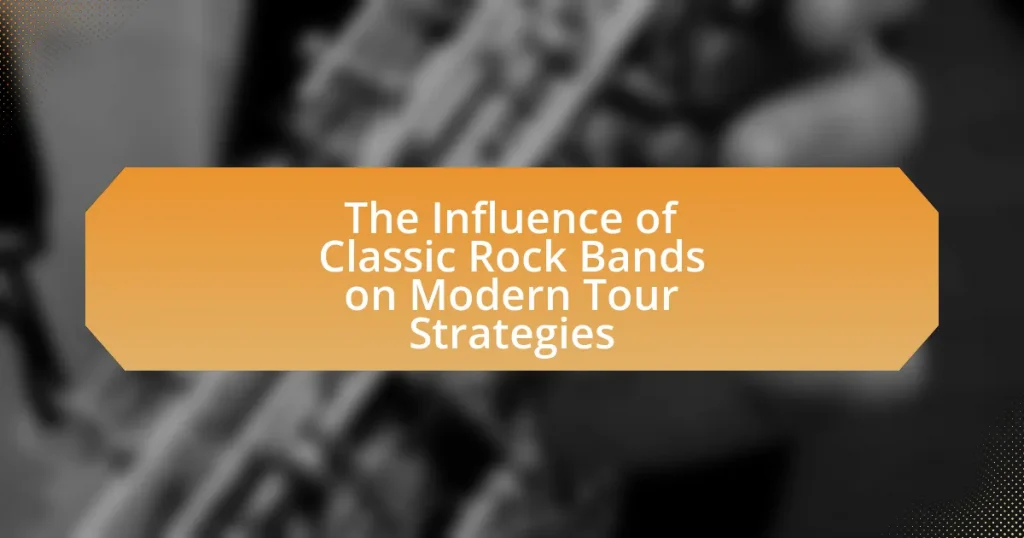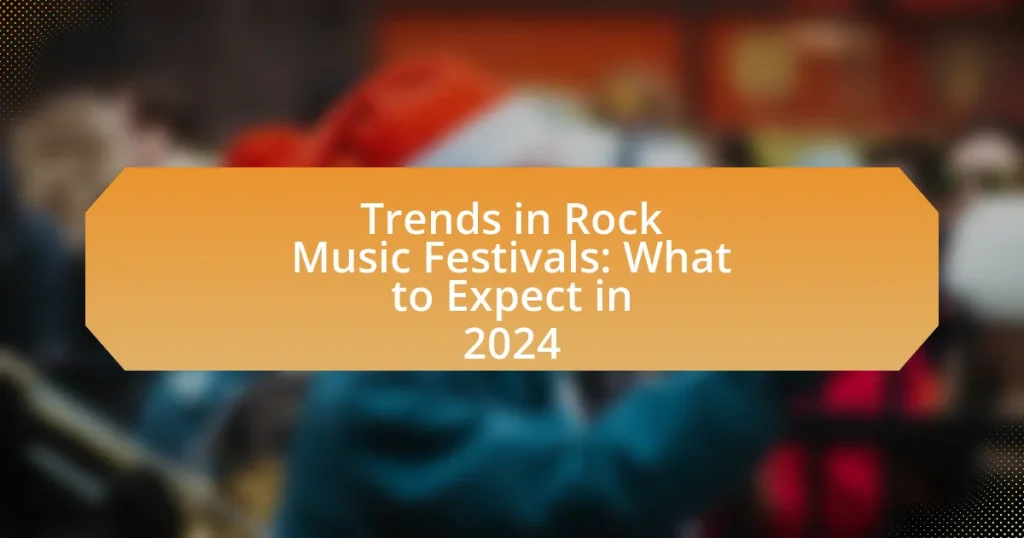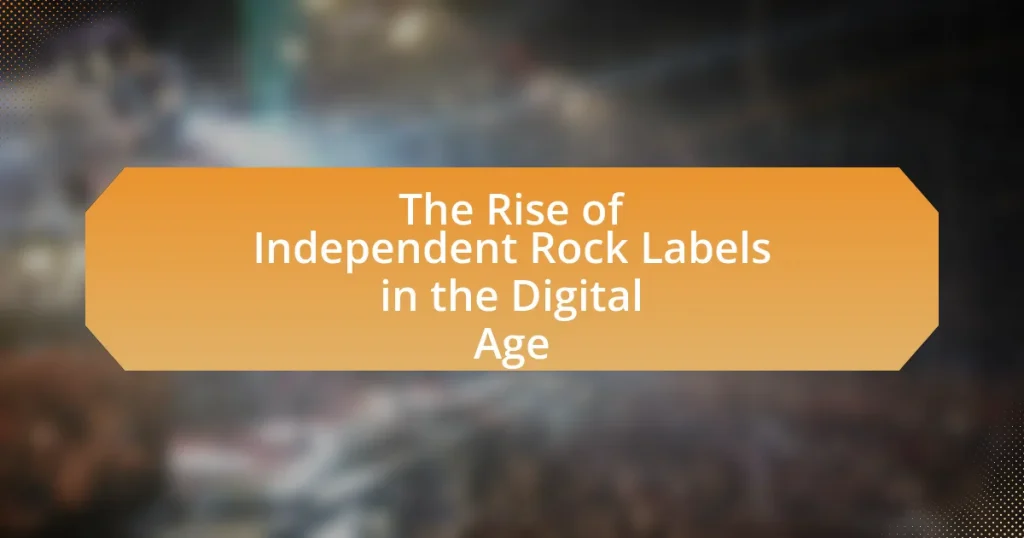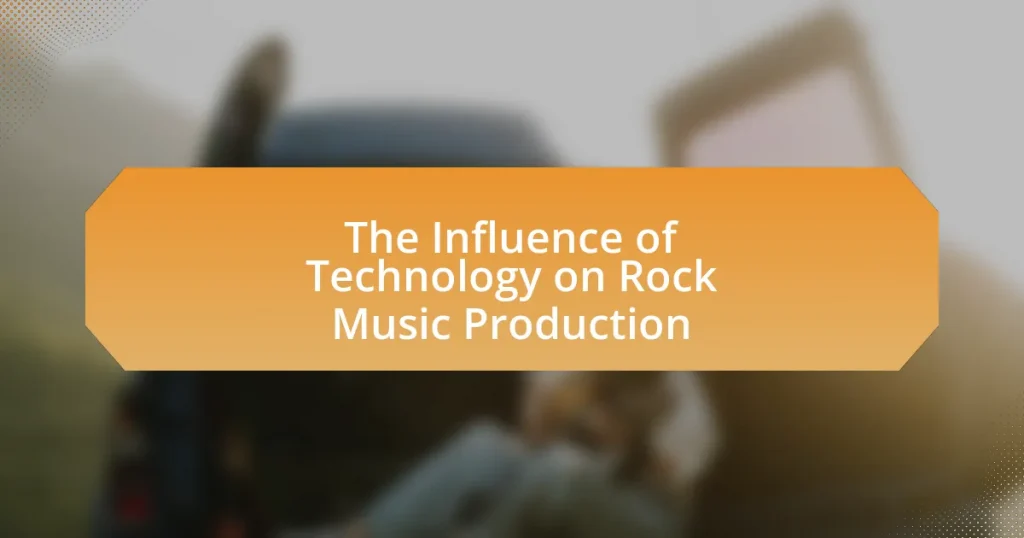The article examines the significant influence of classic rock bands on modern tour strategies, highlighting how these bands established benchmarks for large-scale productions and fan engagement. It discusses the evolution of the touring landscape, emphasizing the elaborate stage designs, extensive merchandising, and innovative marketing techniques pioneered by bands like The Rolling Stones and Led Zeppelin. Additionally, the article explores how nostalgia plays a crucial role in attracting audiences and driving ticket sales, while also detailing the lessons modern bands can learn from classic rock touring methods to enhance their own success. Key strategies such as audience interaction, immersive experiences, and effective use of technology are also analyzed, illustrating their relevance in today’s music industry.
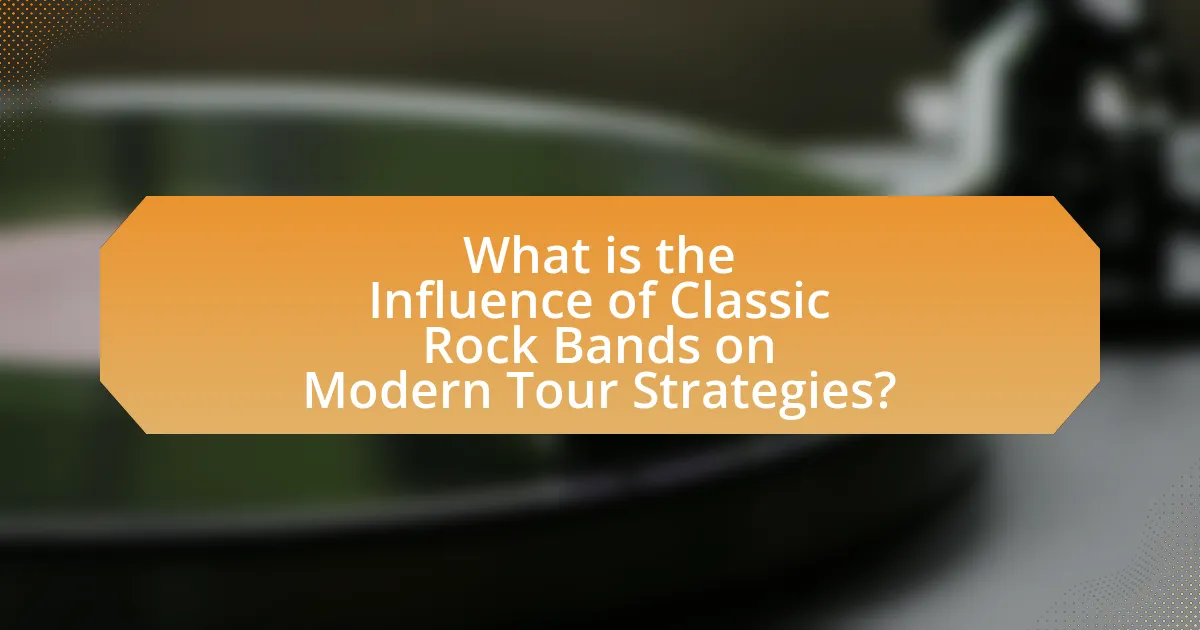
What is the Influence of Classic Rock Bands on Modern Tour Strategies?
Classic rock bands significantly influence modern tour strategies by setting benchmarks for large-scale productions and fan engagement. These bands, such as The Rolling Stones and Led Zeppelin, pioneered elaborate stage setups and extensive marketing campaigns, which have become standard practices in contemporary touring. For instance, The Rolling Stones’ “A Bigger Bang” tour in 2005-2007 grossed over $558 million, demonstrating the financial viability of large tours and the importance of strategic planning in maximizing revenue. Additionally, classic rock bands emphasized the importance of merchandise sales and fan experiences, leading modern artists to adopt similar approaches, including exclusive merchandise and VIP packages to enhance fan loyalty and revenue streams.
How did classic rock bands shape the touring landscape?
Classic rock bands significantly shaped the touring landscape by establishing large-scale concert tours as a primary revenue source and creating elaborate stage productions. Bands like The Rolling Stones and Led Zeppelin pioneered extensive touring schedules, often performing in stadiums and arenas, which set a precedent for future artists. Their innovative use of technology, such as advanced sound systems and lighting, transformed live performances into immersive experiences, influencing how modern tours are designed. Additionally, the success of these bands demonstrated the financial viability of touring, leading to the development of sophisticated marketing strategies and fan engagement practices that are now standard in the industry.
What key elements of classic rock tours influenced modern practices?
Key elements of classic rock tours that influenced modern practices include elaborate stage designs, extensive merchandising, and the use of multimedia presentations. Classic rock bands like Led Zeppelin and The Rolling Stones set high standards for visual spectacle with intricate stage setups and lighting, which modern tours now emulate to enhance audience experience. Additionally, the merchandising strategies pioneered by these bands, such as selling branded merchandise at concerts, have become a staple in contemporary touring practices, significantly contributing to revenue streams. Furthermore, the integration of video screens and visual effects in performances, first popularized by bands like Pink Floyd, has become a common practice in modern concerts, creating immersive experiences for fans.
How did the fan experience evolve from classic rock tours to today?
The fan experience has evolved from classic rock tours to today by incorporating advanced technology, enhanced interactivity, and a focus on immersive experiences. In the classic rock era, fans primarily engaged through live performances and physical merchandise, with limited access to artists outside of concerts. Today, digital platforms allow fans to interact with artists through social media, live streaming, and virtual meet-and-greets, significantly broadening engagement opportunities. Additionally, modern tours often feature elaborate stage designs, augmented reality elements, and personalized experiences, such as VIP packages that include exclusive content and behind-the-scenes access. This shift reflects a broader trend in the music industry towards creating memorable, multifaceted experiences that cater to fan desires for connection and engagement.
Why are classic rock bands still relevant in today’s touring strategies?
Classic rock bands remain relevant in today’s touring strategies due to their established fan base and the nostalgia they evoke. These bands, such as The Rolling Stones and Led Zeppelin, have cultivated a loyal audience over decades, ensuring consistent ticket sales and merchandise revenue. According to a 2022 report by Pollstar, classic rock acts dominated the top-grossing tours, with bands like Eagles and Fleetwood Mac generating millions in revenue, illustrating their financial viability in the current market. Additionally, the integration of classic rock into contemporary media, including films and commercials, reinforces their cultural significance, attracting both older fans and new listeners. This enduring popularity enables promoters to leverage classic rock bands as reliable headliners, making them integral to modern touring strategies.
What lessons can modern bands learn from classic rock touring methods?
Modern bands can learn the importance of building a strong fan connection from classic rock touring methods. Classic rock bands, such as The Rolling Stones and Led Zeppelin, often engaged with their audiences through extensive touring, creating memorable live experiences that fostered loyalty. For instance, The Rolling Stones’ “Steel Wheels Tour” in 1989 grossed over $100 million, demonstrating the financial viability of connecting with fans through live performances. Additionally, classic rock bands utilized strategic marketing and merchandise sales during tours, which modern bands can replicate to enhance revenue and fan engagement. By adopting these practices, modern bands can effectively cultivate a dedicated fan base and maximize their touring success.
How do classic rock bands maintain their legacy through tours?
Classic rock bands maintain their legacy through tours by consistently engaging with their fan base and showcasing their iconic music. These tours often feature setlists that include their greatest hits, which resonate with both long-time fans and new audiences, thereby reinforcing their cultural significance. For example, bands like The Rolling Stones and Led Zeppelin have successfully drawn large crowds, with The Rolling Stones’ “No Filter Tour” in 2019 grossing over $300 million, demonstrating the financial viability and popularity of classic rock tours. Additionally, these tours often incorporate nostalgic elements, such as vintage merchandise and multimedia presentations, which further connect audiences to the band’s history and legacy.
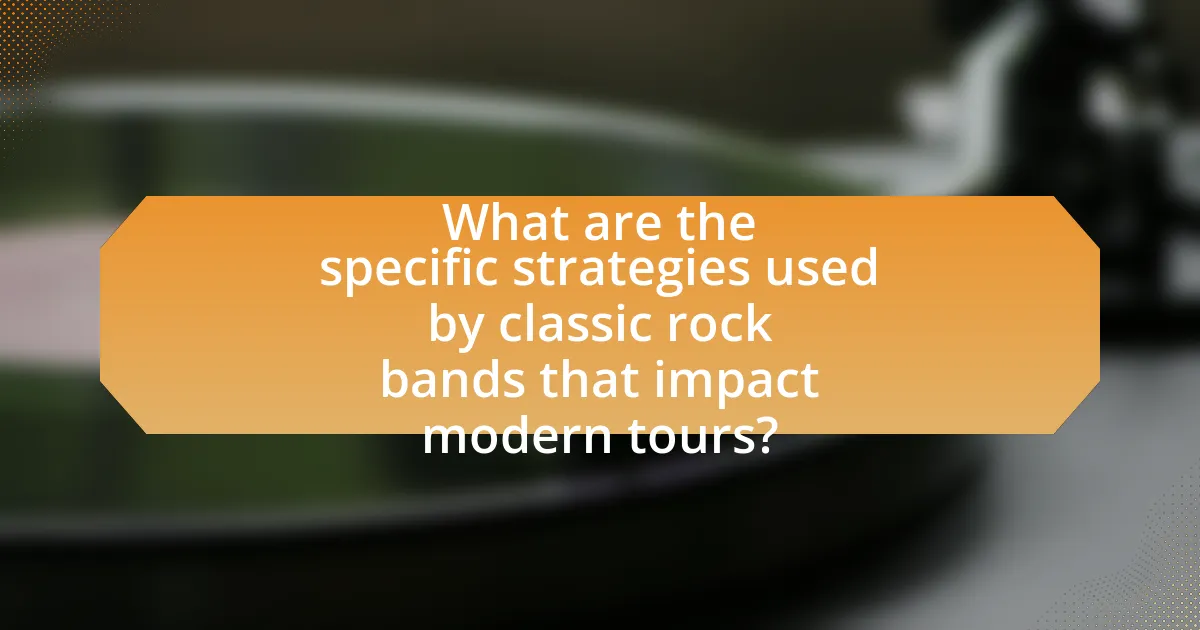
What are the specific strategies used by classic rock bands that impact modern tours?
Classic rock bands employ several specific strategies that significantly impact modern tours, including nostalgia-driven setlists, high production values, and fan engagement through social media. Nostalgia-driven setlists, featuring classic hits, attract both older fans and new audiences, as seen in tours by bands like The Rolling Stones, which often include songs from their extensive catalog. High production values, including elaborate stage designs and lighting, enhance the concert experience, a practice popularized by bands such as Pink Floyd, influencing modern acts to invest similarly. Additionally, classic rock bands utilize social media to connect with fans, promoting tours and merchandise, a strategy that has been adopted widely in the industry, as evidenced by the successful online campaigns of bands like Fleetwood Mac. These strategies collectively shape the expectations and experiences of contemporary concert-goers.
How do classic rock bands utilize marketing in their tours?
Classic rock bands utilize marketing in their tours by leveraging nostalgia, social media engagement, and strategic partnerships. Nostalgia plays a crucial role as these bands often evoke fond memories for fans, which can be harnessed through targeted advertising campaigns that highlight iconic songs and past performances. Social media platforms, such as Facebook and Instagram, are used to connect with audiences, promote tour dates, and share behind-the-scenes content, enhancing fan engagement and excitement. Additionally, partnerships with brands and sponsorships can amplify their reach; for instance, classic rock bands often collaborate with beverage companies or music festivals to create co-branded experiences that attract a wider audience. These marketing strategies are effective in driving ticket sales and maintaining the relevance of classic rock bands in a competitive music landscape.
What marketing techniques from classic rock bands are still effective today?
Classic rock bands effectively utilized merchandise sales as a marketing technique, which remains impactful today. Bands like The Rolling Stones and Led Zeppelin capitalized on branded merchandise, creating a direct revenue stream and enhancing fan engagement. This approach has evolved into modern artists leveraging online platforms to sell merchandise, with statistics showing that merchandise sales can account for up to 30% of an artist’s total income. Additionally, classic rock bands often engaged in extensive touring, building a loyal fan base through live performances, a strategy that continues to be vital for contemporary musicians, as live events generate significant revenue and foster community among fans.
How do classic rock bands engage with their audience during tours?
Classic rock bands engage with their audience during tours through interactive performances, fan participation, and personalized experiences. These bands often incorporate elements such as call-and-response segments, where they encourage the audience to sing along or respond to prompts, fostering a sense of community and involvement. Additionally, many classic rock bands utilize social media platforms to connect with fans before and after shows, sharing behind-the-scenes content and encouraging fan-generated content, which enhances the overall concert experience.
For instance, bands like The Rolling Stones and Led Zeppelin have historically included extended jam sessions and audience interaction in their setlists, creating memorable moments that resonate with fans. This approach not only entertains but also strengthens the emotional connection between the band and its audience, making the concert experience more impactful.
What role does nostalgia play in the touring strategies of classic rock bands?
Nostalgia plays a crucial role in the touring strategies of classic rock bands by leveraging emotional connections to past experiences, which enhances audience engagement and ticket sales. Classic rock bands often curate setlists that feature their most iconic songs, tapping into the collective memories of fans who associate these tracks with significant life events. For instance, bands like The Rolling Stones and Fleetwood Mac have successfully utilized nostalgia by performing albums in their entirety or celebrating milestone anniversaries of classic albums, which has been shown to attract larger audiences and generate higher revenue. This strategy is supported by research indicating that nostalgia can increase consumer spending, as fans are willing to pay premium prices for experiences that evoke cherished memories.
How do classic rock bands leverage nostalgia to attract audiences?
Classic rock bands leverage nostalgia to attract audiences by evoking memories of past cultural moments and musical experiences. They often utilize iconic songs, album artwork, and vintage merchandise to create a sense of familiarity and emotional connection. For instance, bands like The Rolling Stones and Fleetwood Mac frequently include their classic hits in setlists, which resonate with fans who associate these songs with significant life events. Additionally, promotional strategies such as reunion tours and anniversary concerts capitalize on the nostalgia factor, drawing in both older fans and younger audiences curious about the legacy of classic rock. This approach is supported by research indicating that nostalgia can enhance consumer engagement and loyalty, making it a powerful tool in the music industry.
What impact does nostalgia have on ticket sales and merchandise?
Nostalgia significantly boosts ticket sales and merchandise for classic rock bands. This emotional connection to past experiences drives fans to purchase tickets for concerts and buy related merchandise, as they seek to relive cherished memories associated with the music. For instance, a study by the University of Southern California found that nostalgia can increase consumer spending by 20%, particularly in the context of entertainment events. Additionally, classic rock bands often leverage nostalgia through reunion tours and anniversary concerts, which have been shown to sell out quickly, demonstrating the strong market demand fueled by nostalgic sentiments.
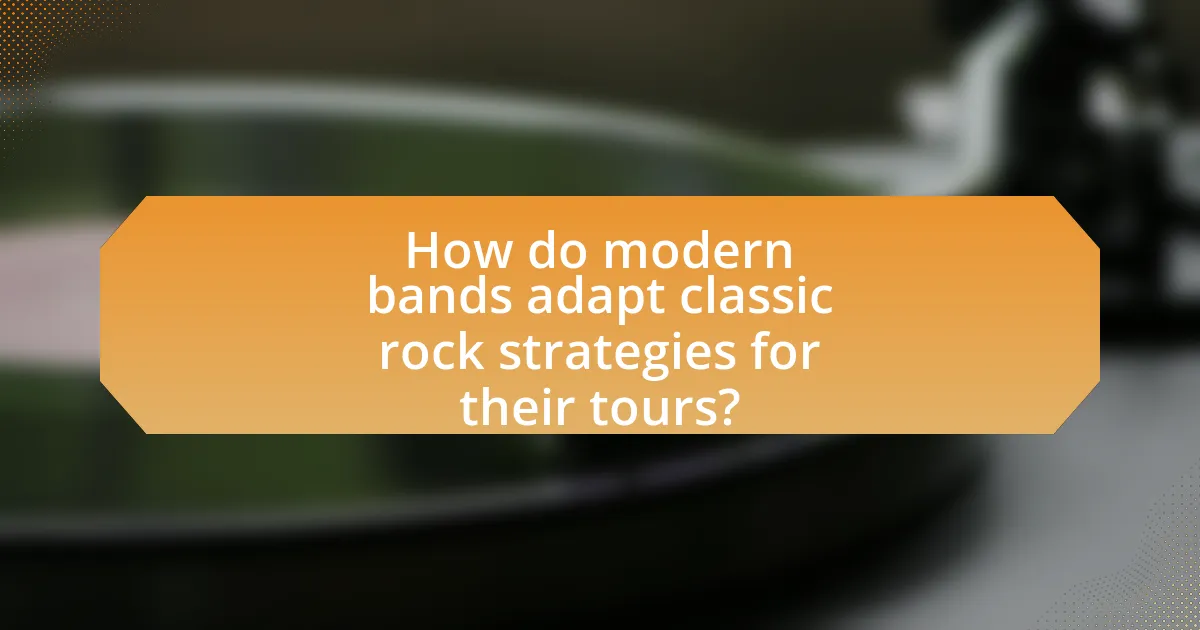
How do modern bands adapt classic rock strategies for their tours?
Modern bands adapt classic rock strategies for their tours by incorporating elaborate stage designs, setlists that include fan favorites, and a focus on audience engagement. For instance, many contemporary artists utilize large-scale visual effects and immersive experiences reminiscent of classic rock spectacles, such as those seen in tours by bands like Pink Floyd and Led Zeppelin. Additionally, modern bands often curate setlists that blend their original music with classic rock covers, appealing to a broader audience and creating a nostalgic connection. This approach is supported by data indicating that tours featuring a mix of original and classic songs tend to attract larger crowds, as seen in the success of artists like Foo Fighters and their inclusion of classic rock anthems in live performances.
What innovative approaches are modern bands taking from classic rock tours?
Modern bands are adopting immersive experiences and elaborate stage designs from classic rock tours to enhance audience engagement. For instance, bands like Foo Fighters and Muse incorporate theatrical elements, such as elaborate light shows and video projections, reminiscent of the grand productions seen in classic rock concerts by bands like Pink Floyd and Led Zeppelin. This approach not only captivates audiences but also creates a memorable atmosphere, similar to the iconic experiences of classic rock tours that emphasized spectacle and showmanship.
How are modern bands incorporating technology into their touring strategies?
Modern bands are incorporating technology into their touring strategies by utilizing advanced data analytics, social media engagement, and innovative stage production techniques. Data analytics allows bands to analyze audience demographics and preferences, enabling them to tailor their performances and marketing efforts effectively. For instance, platforms like Spotify provide insights into listener locations, helping bands optimize their tour routes and setlists based on regional popularity.
Additionally, social media engagement enhances fan interaction and promotes ticket sales through targeted advertising and real-time updates. Bands often use platforms like Instagram and TikTok to share behind-the-scenes content, creating a sense of community and anticipation among fans.
Innovative stage production techniques, such as augmented reality and immersive visuals, enhance the live experience, making concerts more memorable and attracting larger audiences. For example, the use of LED screens and interactive elements has become commonplace, allowing bands to create visually stunning performances that resonate with tech-savvy audiences.
These strategies reflect a shift in how modern bands approach touring, leveraging technology to maximize reach and enhance the overall concert experience.
What are the benefits of blending classic rock strategies with modern trends?
Blending classic rock strategies with modern trends enhances audience engagement and broadens market reach. Classic rock bands often utilized strong branding and memorable live performances, which can be integrated with contemporary digital marketing techniques, such as social media campaigns and streaming platforms. For instance, classic rock’s emphasis on live experiences can be paired with modern trends like virtual concerts, allowing artists to connect with fans globally. This combination not only attracts older audiences familiar with classic rock but also engages younger generations through innovative formats, leading to increased ticket sales and merchandise revenue.
What challenges do modern bands face when implementing classic rock strategies?
Modern bands face several challenges when implementing classic rock strategies, primarily due to shifts in audience preferences and the music industry landscape. The decline of traditional album sales and the rise of streaming services have altered how music is consumed, making it difficult for bands to replicate the classic rock model of extensive touring and album promotion. Additionally, modern audiences often seek more diverse musical experiences, which can conflict with the nostalgia-driven approach of classic rock.
Moreover, the financial demands of touring have increased, with higher costs for production and marketing, making it challenging for new bands to sustain themselves while adhering to classic rock strategies. The need for social media engagement and digital marketing also requires a different skill set than what was traditionally used in classic rock promotion, further complicating the implementation of these strategies.
How do changes in the music industry affect touring strategies?
Changes in the music industry significantly affect touring strategies by altering revenue models, audience engagement, and marketing approaches. For instance, the shift from physical album sales to digital streaming has led artists to rely more on live performances for income, prompting them to plan extensive tours to maximize earnings. According to a 2020 report by the International Federation of the Phonographic Industry, live music accounted for 75% of the total revenue for many artists, highlighting the importance of touring in the current landscape. Additionally, advancements in technology and social media have transformed how artists promote their tours, allowing for targeted marketing and direct interaction with fans, which influences the timing and locations of tours.
What are the financial implications of adopting classic rock touring methods?
Adopting classic rock touring methods can lead to significant financial implications, primarily through increased revenue generation and higher operational costs. Classic rock bands often attract large audiences, resulting in substantial ticket sales; for instance, the Rolling Stones have consistently sold out stadiums, generating millions per concert. However, these methods also entail higher expenses, including elaborate stage setups, extensive marketing campaigns, and larger crew requirements, which can diminish profit margins. Additionally, the nostalgia factor associated with classic rock can justify premium ticket pricing, further enhancing revenue potential. Overall, while classic rock touring methods can yield high financial returns, they also require careful financial management to balance costs and profits effectively.
What best practices can modern bands learn from classic rock touring strategies?
Modern bands can learn several best practices from classic rock touring strategies, including the importance of building a strong fan base through consistent touring, creating memorable live experiences, and leveraging merchandise sales. Classic rock bands like The Rolling Stones and Led Zeppelin established a loyal following by touring extensively, which helped them connect with fans and grow their audience. Additionally, these bands focused on delivering high-energy performances that left lasting impressions, encouraging fans to return for future shows. Merchandise sales also played a crucial role in their revenue, with iconic band t-shirts and memorabilia becoming staples at concerts. By adopting these strategies, modern bands can enhance their touring effectiveness and financial success.
How can modern bands create memorable live experiences for fans?
Modern bands can create memorable live experiences for fans by incorporating immersive visuals, interactive elements, and unique setlists into their performances. For instance, the use of advanced lighting technology and video projections can enhance the emotional impact of the music, similar to how classic rock bands like Pink Floyd utilized elaborate stage designs to captivate audiences. Additionally, engaging fans through social media before and during concerts can foster a sense of community and anticipation, as seen in the strategies employed by contemporary artists like Taylor Swift, who often shares behind-the-scenes content. Furthermore, offering exclusive merchandise or experiences, such as meet-and-greets, can leave lasting impressions on fans, echoing the personalized interactions that were a hallmark of classic rock tours.
What are the key takeaways for successful tour planning based on classic rock influences?
Successful tour planning based on classic rock influences emphasizes the importance of strong branding, audience engagement, and strategic venue selection. Classic rock bands like The Rolling Stones and Led Zeppelin built iconic brands that resonate with fans, which modern tours can emulate by creating a distinct identity and memorable experiences. Engaging the audience through interactive elements, such as meet-and-greets or exclusive merchandise, enhances fan loyalty and attendance. Additionally, selecting venues that align with the band’s image and target demographic, as seen in the successful tours of bands like Fleetwood Mac, ensures optimal attendance and revenue generation. These strategies are validated by the historical success of classic rock tours, which often sold out due to their effective marketing and fan connection.
